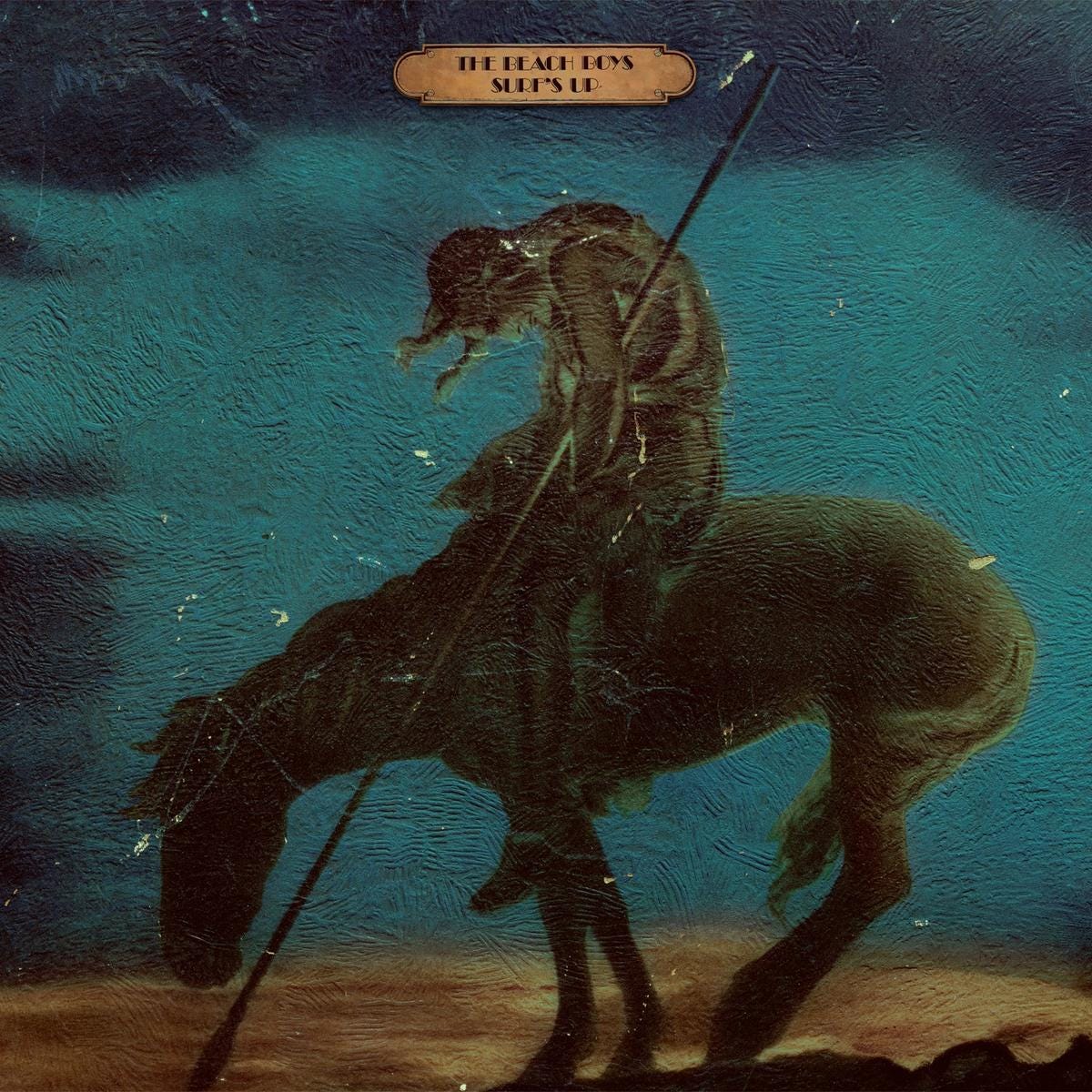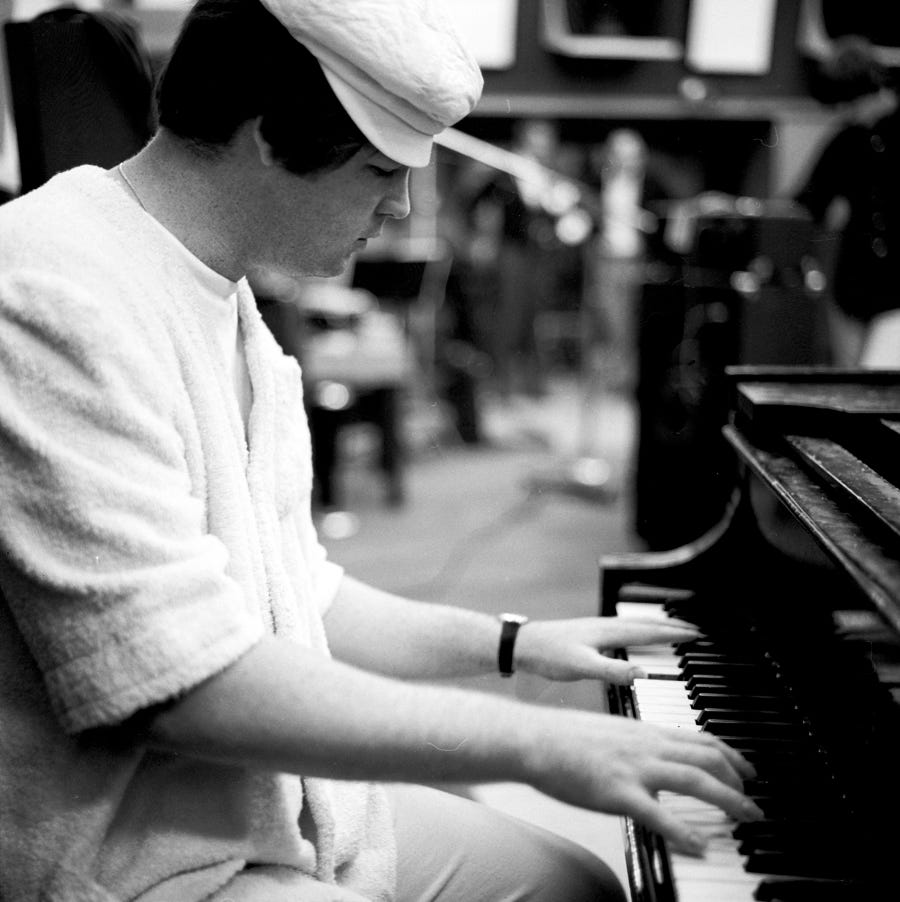Surf's Up
On the Romantic art of Brian Wilson
Since his passing earlier this month, I’ve been listening to Brian Wilson and the Beach Boys much more regularly than I usually—(often)—do, listening to Wilson with that natural intensity attention that comes from mortal circumstances. On repeat have been the classic run of albums between Beach Boys Party!, a fun, very minor, pseudo-live album of mostly covers that preceded Pet Sounds, and Surf’s Up, where Wilson and the band officially ditched the surfer image that had launched them into pop stardom and globalized the myth of sunny modern California. While my favorite Beach Boys album is the stripped-back soul and R&B-influenced Wild Honey, my favorite Beach Boys song is the ultimate and title track from Surf’s Up. It came as a surprise then, when the scholar Joseph Albernaz pointed out the song’s refrain, “The father is the child of the man”, comes from the William Wordsworth poem, “My Heart Leaps Up”.
My heart leaps up when I behold A rainbow in the sky: So was it when my life began; So is it now I am a man; So be it when I shall grow old, Or let me die! The Child is father of the Man; And I could wish my days to be Bound each to each by natural piety.
“Surf’s Up” also references stories by Edgar Allen Poe and Guy de Maupassant, but I had never noticed the Wordsworth connection until Joseph pointed it out. The refrain always seemed beyond language, the harmonies heavenly somber—far and away the best thing the band ever did. And it wasn’t Brian Wilson who introduced me to the Wordsworth line either, but another key American Romantic: Cormac McCarthy.
Here is the line in the opening of Blood Meridian:
The mother dead these fourteen years did incubate in her bosom the creature who would carry her off. The father never speaks her name, the child does not know it. He has a sister in this world he will never see again. He watches, pale and unwashed. He can neither read nor write and in him broods already a taste for mindless violence. All history present in that visage. The child the father of the man.
The medium couldn’t be more different, but I think there’s something more profound in the connection between Wilson and McCarthy than mere coincidence (or straightforward influence) would imply. Both are artists of the American West, yes, but a cosmic American West, at the beginning and end of time. Golden California furnishes the scenery for the penultimate chapters of Blood Meridian, when the kid and the Glanton Gang finally run out of continent. The outlaws turn up in old Los Angeles, wash themselves in the surf, exhausted by their exploits. That’s also the mood of Surf’s Up, with a painting based on James Earle Fraser’s End of the Trail adorning the cover, one of the millions of copies of that image, surely, seen in every other country law office and cheap motel lobby between the Mississippi to the Pacific. A corny picture, inescapable, but right in context.
Sad surfers, sad cowboys, sad Indians. They’re like plastic figurines left in the sand, waiting for the advancing tide. Wilson and McCarthy indulged in childish art, but they lived in a country that was—40, 50, 60 years ago—much younger than it is now, much younger but much more mature; the childishness was more mature. It came with luscious vocal harmonies, with the clarinet and the flugelhorn, with fetching and trivial words, echoes of long-dead poets, barely heard, from other coasts and other continents.
Surf's Up A diamond necklace played the pawn Hand in hand, some drummed along, oh To a handsome mannered baton (Bygone, bygone) A blind class aristocracy Back through the opera glass, you see The pit and the pendulum drawn (Bygone, bygone) Columnated ruins domino Canvass the town and brush the backdrop Are you sleeping Brother John? Hung velvet overtaken me Dim chandelier awaken me To a song dissolved in the dawn (Bygone, bygone) The music hall, a costly bow The music all is lost for now To a muted trumpeter swan (Bygone, bygone) Columnated ruins domino Canvass the town and brush the backdrop Are you sleeping, Brother John? Dove nested towers, the hour was Strike the street, quicksilver moon Carriage across the fog Two-step to lamp lights cellar tune The laughs come hard in "Auld Lang Syne" The glass was raised, the fired rose The fullness of the wine, the dim last toasting While at port, adieu or die A choke of grief, heart hardened, I Beyond belief, a broken man, too tough to cry Surf's up, Aboard a tidal wave Come about hard and join The young and often spring you gave I heard the word Wonderful thing A children's song Child, child, child, child, child A child is the father of the man Child, child, child, child, child A child is the father of the man A children's song Have you listened as they played? Their song is love And the children know the way That's why the child is the father to the man Child, child, child, child, child Child, child, child, child, child Na na na na na na na na Child, child, child, child, child That's why the child is the father to the man Child, child, child, child, child
On the Limitations of Air Conditioning
There are certain limitations to air conditioning that, until this recent heat wave, I’ve been ignorant of. Even in an otherwise well-cooled structure, the temperature outside is still palpable, still causes irritation and lethargy. It has to do with, I think, the sickly color of the light coming in from the windows, the subtle radiation from the walls and ceiling. It’s a strange constricting sensation, oppression and relief at the same time, but one that is, of course, not comparable to actually being exposed to the elements.
The Suture of Revision
A discarded draft, once taken up again, should be handled tenderly, like cherished wounded flesh, the voids sutured with care.



